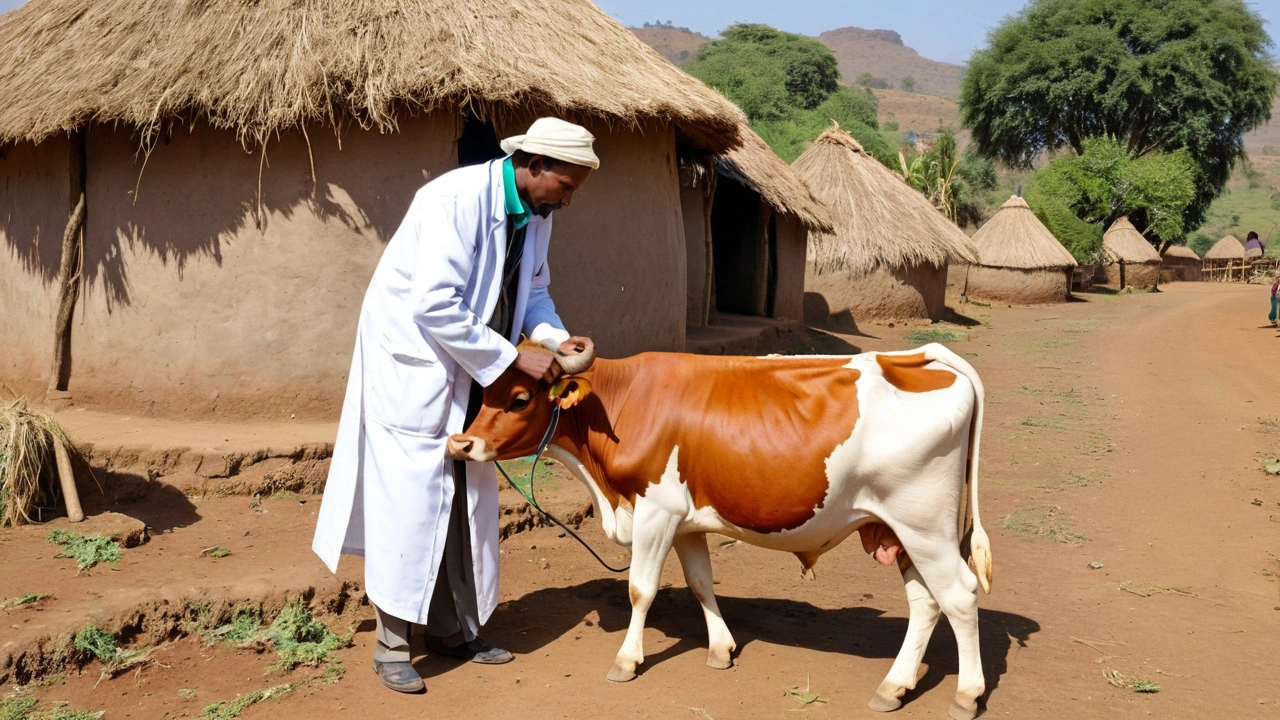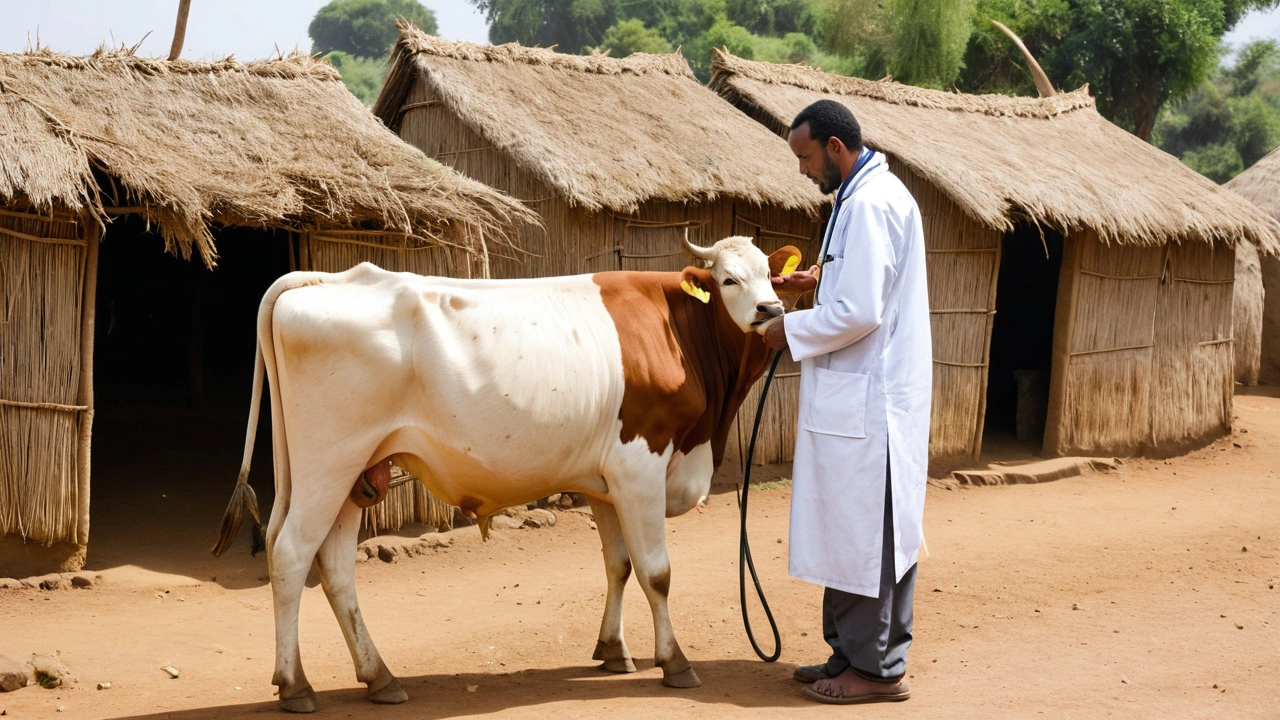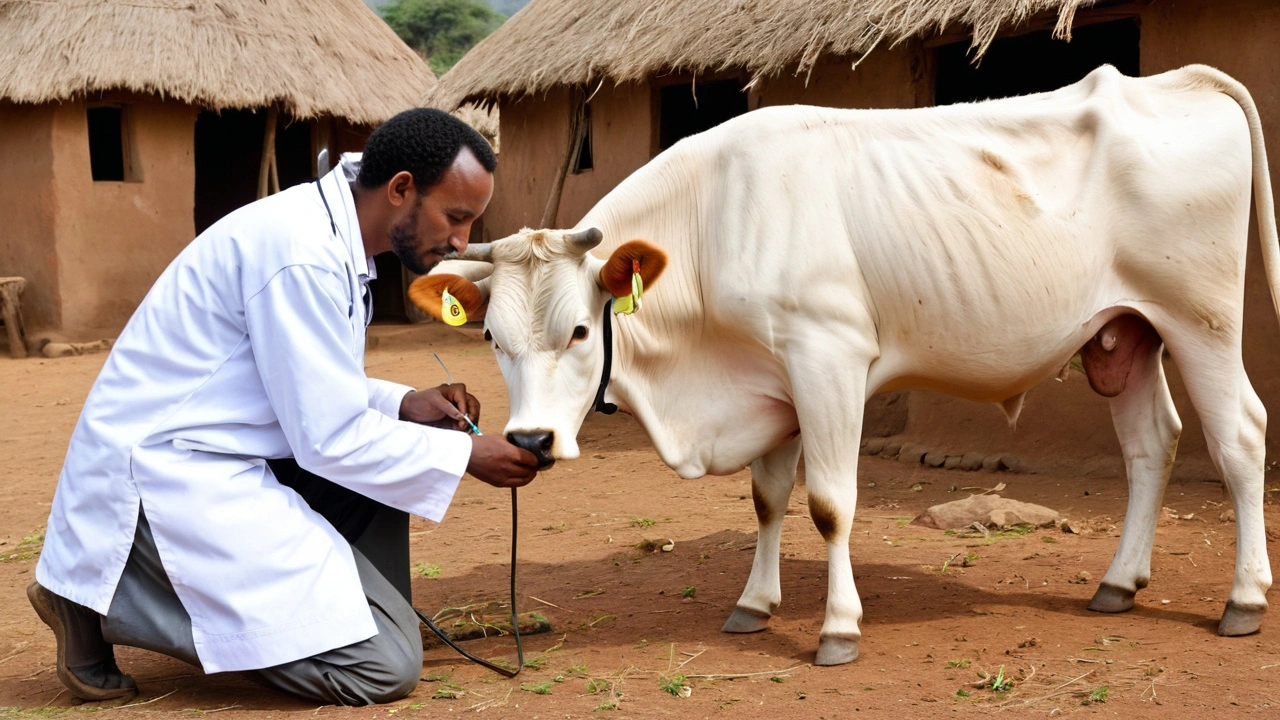Curious about how much veterinarians make in Ethiopia? The journey of a vet is both rewarding and financially variable. Let's uncover the figures, influences, and quirks of this profession.
If you're just stepping into the veterinary world, expect a basic starting salary. New graduates typically earn between ETB 10,000 to 15,000 monthly. Experience increases these numbers significantly, highlighting the difference practice years can make.
A veterinarian's salary depends on several factors. These include education, experience, and location. Specialized vets or those with a doctorate often fetch higher salaries. Likewise, working in urban versus rural areas can change one's income.
Location plays a big role too. Urban centers like Addis Ababa offer more competitive salaries compared to rural areas. This reflects the demand and cost of living disparities.
Economic factors affect pay as well. Ethiopia's economy influences job availability and salary rates. Vets working for government institutions might find their pay differing from those in private practice.
Did you know some Ethiopian vets work with exotic animals or participate in wildlife conservation efforts? It’s an exciting field with diverse opportunities. Networking and continual learning are key for aspiring vets aiming to maximize their careers in Ethiopia.
- Starting Salaries for Veterinarians in Ethiopia
- Factors Influencing Veterinarian Pay
- Regional Disparities in Veterinary Salaries
- Economic Considerations
- Interesting Facts about Vets in Ethiopia
- Career Tips for Aspiring Veterinarians
Starting Salaries for Veterinarians in Ethiopia
Graduating from veterinary school is an accomplishment on its own, but when it comes to transitioning into the professional world, knowing what to expect in terms of salary is invaluable. In Ethiopia, new veterinarians can expect to begin their careers with a salary range between ETB 10,000 to 15,000 per month. This starting pay is a combination of many influencing factors, including the specific region where the vet practices and the type of employer.
Most fresh graduates find their initial employment opportunities within government institutions, research facilities, or private clinics. Each of these sectors offers different benefits and salary scales. For instance, veterinarians employed by the government, specifically within the Ministry of Agriculture, might start at an entry-level salary but typically enjoy job stability and benefits such as health insurance and pension plans. In contrast, private clinics may offer varied pay scales, often on the higher end, as they are profit-driven and cater to the more affluent communities in urban areas.
The geographical location of the clinic or institution also plays a major role in determining a veterinarian’s starting salary. Urban areas, particularly Addis Ababa, tend to offer higher pay to match the higher cost of living. Vets working in these settings often receive additional incentives like housing allowances, transport allowances, or bonuses. On the other hand, rural areas may offer lower salaries but provide significant opportunities to gain hands-on experience due to the high demand for veterinary services among livestock keepers.
Education and qualifications further impact starting salaries. Vets with specialized training or advanced degrees often manage to command higher starting pays. Specializations in fields such as surgery, internal medicine, or exotic animal care make these veterinarians particularly valuable, leading to better pay packages. Veterinary graduates from international universities or those who have undergone training programs abroad also enjoy a competitive edge in the job market.
It's also worth noting the influence of the economic climate on salaries. Economic improvements in Ethiopia over the past decade have gradually led to higher salaries across many professions, including veterinary medicine. However, fluctuations in the economy can impact these figures, affecting pay raises and new job opportunities. It’s a dynamic environment where pay scales must adapt to varying economic conditions.
Starting salaries for veterinarians in Ethiopia are promising but require navigational skills to optimize earnings. A blend of location choice, continuous professional development, and understanding the industry’s landscape contribute significantly to a positive start. Given the evolving nature of veterinary science and the country’s growing recognition of animal health, aspiring veterinarians have much to look forward to as they embark on their professional journeys.
“The veterinary profession is a noble and rewarding calling, both emotionally and financially, as it continues to evolve and expand within Ethiopia,” says Dr. Ayele Getahun, a renowned veterinary professional with over 20 years of experience in the field.
Factors Influencing Veterinarian Pay
Curious about what determines a veterinarian's paycheck in Ethiopia? It's fascinating how various elements come into play. First up is education. Vets with advanced degrees or special certifications often earn more. For instance, a vet who specializes in surgery doesn't make the same as a general practice vet. This distinction in specialization creates big differences in salary.
Another major factor is experience. New graduates start on the lower end of the pay scale, but as they gain years of practice, their salary usually increases. A vet with over ten years of experience is likely to earn a lot more than someone just starting out. It’s all about building your skills and reputation over time.
Location also matters. In Addis Ababa, where the cost of living is higher, vets often get paid more than their counterparts in smaller towns or rural areas. There's a higher demand for specialized animal care in big cities, which drives up wages. Comparing this, rural settings often face financial constraints, resulting in lower pay despite the critical role vets play there.
Working environment impacts paychecks too. Vets employed by government institutions like the Ministry of Agriculture often have more stable salaries but may not earn as much as those in private practice. Private sector veterinarians can potentially earn higher incomes, especially if they manage their own clinics or work with high-paying clients. There's also the possibility of combining different job roles, like consultancy or educational roles at universities, which can add to the income.
Special roles in the field can lead to unique salary structures. For example, vets working with animal welfare organizations or in wildlife conservation can see different financial rewards compared to traditional pet or livestock care. These special roles may not always pay the highest, but they come with unique job satisfaction and experiences.
According to Dr. Tadesse Amare, a notable vet in Ethiopia, "The passion for animal care in Ethiopia is as strong as anywhere else, but our challenges include financial limitations and varied compensation structures."This insight reveals another layer: the economic health of the country. Ethiopia’s broader economic landscape influences job availability and wage rates directly.
Networking in the veterinary community also plays a role. Knowing the right people can lead to higher-paying opportunities or specialized roles not advertised widely. Continuous professional development, like attending workshops and conferences, enhances both skills and connections.
Lastly, the type of animals a veterinarian works with can affect pay. Exotic animal vets or those specializing in rare species can command higher fees due to the specialized knowledge and care required. These roles are less common, adding an exclusivity factor.
So, while many factors influence veterinarian pay in Ethiopia, from education and experience to location and specialization, it’s clear that a vet’s income is a complex web of interrelated elements. It takes patience, passion, and ongoing learning to navigate and maximize earnings in this rewarding career.

Regional Disparities in Veterinary Salaries
Veterinarian salaries in Ethiopia differ significantly depending on the region. This disparity can be attributed to several factors such as cost of living, demand for veterinary services, and availability of resources. Urban areas like Addis Ababa, the capital city, typically offer higher salaries compared to rural regions. The urban veterinary market is competitive and has a higher demand due to the higher concentration of pet owners and agricultural businesses in need of animal care.
In Addis Ababa, the monthly salary for a veterinarian can range from ETB 15,000 to ETB 25,000, depending on the veterinarian's experience and specialty. This is considerably higher than rural areas where veterinarians might earn between ETB 8,000 to ETB 12,000 per month. One reason for this difference is the higher cost of living in urban areas, which requires employers to offer more competitive wages to attract skilled professionals.
Rural regions, while offering lower salaries, often provide unique opportunities for veterinarians. In these areas, vets might work more closely with farmers, providing essential services to ensure the health of livestock, which is a crucial component of the local economy. Interestingly, veterinarians working in rural areas might have a more varied and hands-on experience, dealing with a wider range of animals and medical conditions on a daily basis.
Another contributing factor to salary disparities is the type of employer. Government institutions and non-governmental organizations (NGOs) might offer different compensation packages compared to private clinics. For instance, a veterinarian employed by a government agency in a rural area may receive additional benefits such as housing allowances, transportation, or other perks that are not always available in urban centers. These benefits can partially offset the lower base salary offered in these regions.
A Dr. Mekonnen, a seasoned veterinarian, once mentioned, "In rural areas, the work is more challenging but incredibly rewarding. There is a strong sense of community and the impact you make is immediately visible." This perspective highlights the non-monetary rewards that come with working in less urbanized settings.
It's also worth noting that regional disparities in veterinarian salaries are not unique to Ethiopia and can be seen in many countries around the world. Local economic conditions, the presence of veterinary schools, and regional health issues all play a role in shaping these salary differences. For aspiring veterinarians, understanding these factors and choosing the right region to practice can significantly impact their career trajectory and professional satisfaction.
Economic Considerations
Understanding the economic landscape is crucial for veterinarians in Ethiopia. The country's economy has seen changes and fluctuations, which directly affect the job market and salary expectations for professionals in many fields, including veterinary medicine. Over the years, Ethiopia has undergone significant economic growth, but challenges still remain that impact the earnings of vets.
One specific factor influencing veterinarians' salaries is the gap between public and private sectors. Vets working in private practices, especially those in high-demand urban areas like Addis Ababa, might earn more than their counterparts in public service. Government jobs often come with the benefit of job security but might not be as lucrative as private endeavors.
Inflation and cost of living are other economic considerations. In cities where the cost of living is high, veterinarians may demand higher salaries to maintain a decent standard of living. On the other hand, in rural areas, where the cost of living is lower, salaries might not be as competitive. This disparity can significantly affect where a veterinarian might want to practice.
Foreign investment and economic policies also play a role. Ethiopia has attracted international investment, and this influx of funds can create more opportunities for veterinarians, particularly in sectors like livestock farming and pet care. The growth in these areas can increase the demand for veterinary services, potentially driving up salaries.
A valuable insight from the Ethiopian Veterinary Association highlights the influence of economic growth on the profession.
"With the country's economic development, the demand for skilled veterinary services has increased, leading to better compensation packages for veterinarians," says Dr. Solomon, a prominent figure in the association.This statement underscores the link between economic progress and professional remuneration.
It's also worth noting that the agricultural sector, a major part of Ethiopia's economy, plays a critical role in determining veterinarians' pay. Since a significant portion of Ethiopia's GDP comes from agriculture, which includes livestock, vets involved in this sector are highly valued. Their services are crucial for maintaining animal health, which in turn supports the agricultural economy.
While the economic prospects for veterinarians in Ethiopia continue to evolve, it is clear that multiple factors including sector of employment, cost of living, foreign investment, and agriculture, all impact salaries. Aspiring veterinarians should keep these considerations in mind as they navigate their careers in this dynamic field.

Interesting Facts about Vets in Ethiopia
Exploring the world of veterinarians in Ethiopia reveals some fascinating insights. It's a profession that goes beyond typical animal care and integrates deeply with the country's unique cultural and environmental landscape. Let's dive into some interesting aspects of being a vet in Ethiopia.
Firstly, did you know that Ethiopian veterinarians often engage in wildlife conservation? The country is home to rare and exotic species like the Ethiopian wolf and the Gelada baboon. Vets working in conservation areas or with wildlife NGOs play a crucial role in preserving these animals. It's not just about domestic pets; it's a commitment to biodiversity. Vets in Ethiopia are trained to handle a range of species, making their career quite diverse and challenging.
Another fascinating fact is the cultural significance of livestock in Ethiopian society. Cattle, for example, are deeply integrated into the rural way of life. They are a symbol of wealth and social status in many communities. Vets working in rural areas not only provide medical care for these animals but also advise farmers on animal husbandry practices. This advisory role often goes beyond typical veterinary duties, influencing agricultural productivity and livelihoods.
Moreover, veterinarians here often partake in educational initiatives. There's a significant emphasis on public health when it comes to zoonotic diseases—those that can transfer from animals to humans. Veterinarians conduct workshops and training sessions in communities to educate people about these diseases, improving overall public health. They collaborate with local health officials and international bodies to control outbreaks, making their contributions vital on multiple levels.
In urban areas, veterinarians are witnessing a growing trend of pet ownership. Addis Ababa, for example, has seen an increase in the number of households owning dogs, cats, and exotic pets. This shift is driving the demand for specialized veterinary services, like pet dentistry and advanced surgical procedures. Urban veterinarians often need to stay updated with the latest medical advancements to meet the demands of pet owners, making continuous education a key part of their professional life.
Interestingly, Ethiopian veterinarians are making strides in research as well. Universities and research institutions in the country work on various projects related to animal health. From studying the impact of climate change on livestock to developing new vaccines, these research efforts are contributing to both local and global knowledge pools. Collaborations with international researchers are quite common, showcasing the global relevance and interconnectedness of their work.
A quote from Dr. Mulugeta Assefa, a renowned veterinarian and researcher at Addis Ababa University, summarizes this well:
"Being a veterinarian in Ethiopia is not just a job; it's a multifaceted role that combines medical science, community service, and environmental stewardship. Our work has a lasting impact on people, animals, and the ecosystem."These facts highlight the unique and impactful nature of the veterinary profession in Ethiopia. It's a career filled with variety, responsibility, and a profound connection to both the community and the environment.
Career Tips for Aspiring Veterinarians
Becoming a veterinarian is a dream for many who love animals. But it takes a lot more than affection for pets to succeed in this field. Here's how to navigate your journey and set yourself up for a rewarding career in veterinary medicine in Ethiopia.
The first and most crucial step is your education. Enrolling in a recognized veterinary school is essential. In Ethiopia, Addis Ababa University offers one of the most reputable veterinary medicine programs. Be prepared to dedicate several years to intense study, covering everything from basic animal biology to advanced surgical techniques.
You should also prioritize gaining practical experience. Internships and volunteer opportunities at animal clinics or farms can provide invaluable hands-on training. Many students find that applying their theoretical knowledge in real-world settings brings the lessons to life. This experience is often what sets you apart from other candidates when seeking employment.
Networking plays a significant role too. Joining veterinary associations and attending conferences can introduce you to valuable contacts. These can range from experienced mentors to potential employers. Networking isn't just about finding jobs; it allows you to stay updated with the latest research and advancements in veterinary practices.
"In Ethiopia, building relationships with local communities and farmers can make a tremendous difference in a veterinarian's career," says Dr. Tadesse Daba, a prominent veterinarian in Addis Ababa.
Another critical tip is to specialize in a niche area. Whether it's large animals, pets, or exotic species, specialization can enhance your expertise and boost your earning potential. Veterinary fields like surgery and dentistry are in demand and can offer lucrative opportunities.
Keep learning. The field of veterinary medicine is always evolving. Continuing education through workshops, online courses, or advanced degrees can keep your skills sharp and relevant. Lifelong learning is not just encouraged but is often necessary to maintain a competitive edge.
Insurance knowledge is crucial too. Understanding different types of veterinary insurance options can help you guide pet owners better. This insight also helps in managing your practice's financial health.
Lastly, remember the importance of work-life balance. Veterinary careers can be demanding, so it's vital to find ways to manage stress and avoid burnout. Self-care is not just beneficial for you but ultimately impacts the quality of care you provide your animal patients.
With passion, dedication, and continual learning, aspiring veterinarians in Ethiopia can carve out a prosperous career while making a meaningful difference.

 Is Healthcare Free in Ethiopia? Understanding the Costs and Accessibility
Is Healthcare Free in Ethiopia? Understanding the Costs and Accessibility
 Ways People Earn a Living in Ethiopia: Unique Opportunities and Challenges
Ways People Earn a Living in Ethiopia: Unique Opportunities and Challenges
 Exploring Common Occupations in Ethiopia: Agriculture, Technology, and Beyond
Exploring Common Occupations in Ethiopia: Agriculture, Technology, and Beyond
 Understanding the Average Income in Ethiopia Measured in US Dollars
Understanding the Average Income in Ethiopia Measured in US Dollars
 Discovering the Richest Fields in Ethiopia: Agriculture, Coffee, Culture, and More
Discovering the Richest Fields in Ethiopia: Agriculture, Coffee, Culture, and More
Douglas Gnesda
July 24, 2024 AT 17:39When dissecting the remuneration landscape for Ethiopian veterinarians, one must weigh the interplay of macroeconomic indices, regional cost‑of‑living differentials, and sectoral employer typologies. The baseline ETB 10,000‑15,000 range for neophyte vets reflects a nascent labor market calibrated to the nation's GDP per capita. Urban agglomerations such as Addis Ababa impose premium wage brackets-often upward of ETB 20,000-to offset housing and transport inflation. Conversely, rural clinics operate under subsistence economics, buoyed by livestock‑centric economies, where ancillary benefits like land allotments partially compensate for lower cash salaries. Specialization vectors, for instance in bovine surgery or wildlife health, introduce a merit‑based premium, typically manifesting as a 30‑50% earnings uplift. Government tenure, while delivering pensionable stability, seldom rivals private practice profitability because public health budgets are constrained by fiscal policy cycles. Moreover, foreign direct investment in agribusiness catalyzes demand for veterinary consultants, further stratifying income tiers. In essence, the compensation schema is a multidimensional matrix that integrates experience, specialization, geographic locus, and institutional affiliation.
Abhijit Pimpale
July 25, 2024 AT 10:19The cited salary bands ignore inflation-adjusted real wages, thus overstating purchasing power.
Eric DE FONDAUMIERE
July 26, 2024 AT 02:59Yo, if you dive into those ETB figures you’ll see the real jump happens after the first five years – that’s when you can start negotiating bonuses, housing stipends, and maybe even a lil’ profit share if you’re in a private clinic! Keep hustlin’, the field’s lit and the impact is massive, even if the paycheck starts modest.
Pauline Herrin
July 26, 2024 AT 19:39It must be emphasized that the presentation of salary data without a clear source undermines the credibility of the analysis. A rigorous quantitative study should reference official Ministry of Agriculture payroll records or peer‑reviewed labor surveys. Absent such citations, the figures remain anecdotal, and policy recommendations derived therefrom risk being misguided.
pradeep kumar
July 27, 2024 AT 12:19The urban‑rural pay gap is presented without accounting for the higher occupational hazards faced by rural vets, which should merit hazard pay.
love monster
July 28, 2024 AT 04:59While the urban premium is undeniable, it’s worth noting that many vets thrive by leveraging community trust in rural settings, which can translate into long‑term client loyalty and supplemental income streams such as consultancy and training workshops.
Building those relationships early can offset the nominal salary differences.
Christian Barthelt
July 28, 2024 AT 21:39One must question the assumption that “client loyalty” automatically yields financial benefit; loyalty does not guarantee higher fees, especially when rural economies operate on barter or low‑margin transactions.
Ify Okocha
July 29, 2024 AT 14:19Delving deeper into the socioeconomic fabric of Ethiopia reveals that veterinary remuneration cannot be decoupled from agricultural productivity cycles, which are themselves subject to climatic volatility and market price fluctuations.
During drought years, livestock mortality spikes, prompting emergency veterinary interventions that are often funded by NGOs rather than the state, thereby skewing private practice income upward temporarily.
Conversely, in years of surplus harvest, disposable income among smallholder farmers rises, allowing for elective veterinary services such as preventive vaccinations, which generate steady revenue streams for rural practitioners.
The dichotomy between public sector pay scales and private sector earnings is further complicated by the fact that government veterinarians receive non‑monetary perks-housing, transport allowances, and pension accrual-that are not directly comparable to cash compensation.
Specialization adds another layer: vets who acquire certification in exotic wildlife care are eligible for project‑based contracts with international conservation bodies, often paying in foreign currency, which considerably boosts household purchasing power.
Nevertheless, the accessibility of such niche training is limited, creating an elite subset of veterinarians whose earnings far outpace the median.
Gender dynamics also play a subtle yet measurable role; women veterinarians may encounter implicit wage gaps, especially in private urban clinics, where negotiation leverage differs from their male counterparts.
Moreover, the regulatory environment dictates salary ceilings in certain government posts, capping earnings despite experience levels.
International collaborations, such as joint research initiatives with universities abroad, provide stipends and grants that supplement regular income, yet these opportunities are predominantly concentrated in Addis Ababa, reinforcing the urban‑rural disparity.
It is also crucial to recognize the impact of inflation: the real value of a nominal ETB 20,000 salary in 2020 differs markedly from the same figure in 2024, eroding purchasing power unless adjusted for cost‑of‑living indices.
Professional associations, like the Ethiopian Veterinary Association, have advocated for standardized salary bands, but implementation remains uneven across regions.
Ultimately, the salary landscape is a complex, multi‑factorial system where location, sector, specialization, gender, and macro‑economic conditions intertwine, making any singular figure an oversimplification.
William Anderson
July 30, 2024 AT 06:59The numbers are laughably vague.
Sherri Gassaway
July 30, 2024 AT 23:39One might contemplate that the very act of quantifying veterinary worth reflects a broader societal impulse to assign economic value to caregiving, a task that traditionally resists commodification.